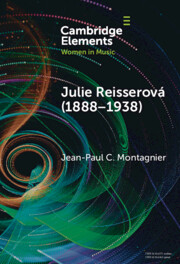Refine search
Actions for selected content:
3 results
32 - Czech Classical Music in a Global World: Jakub Hrůša in Conversation with Aleš Březina
- from Part III - The Twentieth Century and Beyond
-
-
- Book:
- A History of Music in the Czech Lands
- Published online:
- 21 October 2025
- Print publication:
- 16 October 2025, pp 450-461
-
- Chapter
- Export citation
13 - “The Very Bosom of our Nation”: The Dialectic of Folk and Art Music in Bedřich Smetana’s Hubička and Dvě vdovy
- from Part II - The “Long” Nineteenth Century
-
-
- Book:
- A History of Music in the Czech Lands
- Published online:
- 21 October 2025
- Print publication:
- 16 October 2025, pp 186-198
-
- Chapter
- Export citation

Julie Reisserová (1888–1938)
- Czech Composer and Feminist
-
- Published online:
- 07 February 2025
- Print publication:
- 06 March 2025
-
- Element
- Export citation
